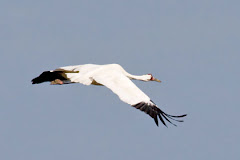
The Wausau Daily Herald ran this story today about REGI.
By Nick Halter • Wausau Daily Herald • January 13, 2009
Trumpeter swans with lead pellets and fishing tackle in their digestive systems are showing up in record numbers at an avian rehabilitation center in Antigo.
Since Dec. 1, 12 of the endangered birds have been treated at Raptor Education Group Inc., the only place in the state that rehabilitates the birds. The nonprofit organization typically treats three to four trumpeters a year for lead poisoning, said Marge Gibson, executive director.
"No one in the country has seen this amount of lead before," Gibson said, citing swans that have ingested as many as 65 lead pellets. She said her team has been working around the clock to treat the birds, several of which have died because of unprecedented amounts of lead.
The direct cause of the poisoning is shotgun pellets that remain at the bottom of lakes and streams. Lead was banned from waterfowl hunting nationwide in 1988, but the metal never dissolves, said Patricia Manthey, assistant avian ecologist for the Wisconsin Department of Natural Resources.
Gibson and Manthey said the increase in lead-poisoned swans is related to recent droughts that have allowed swans to feed in lead-infested waters that were once too deep.
Others think the increase in sick swans is related to a moratorium Minnesota and Wisconsin put on feeding the birds this winter. The measures were put in place because both states were concerned disease could spread in the dense areas where swans had been feeding each winter.
The Minnesota DNR told the St. Paul Pioneer Press that the moratorium forced the swans to fly from their normal feeding spots to other lakes, where they ingested lead pellets.
Officials at an avian rehab center in Minnesota told the Pioneer Press it has treated 30 swans since the fall; it normally treats about two dozen a year.
Both states since have started feeding the swans again.
Manthey said it is too early to assume the feeding moratorium is to blame. Wisconsin swans migrate to Hudson, where the DNR had fed them until this fall. Eight of the birds sent to Gibson were from that area; four were from elsewhere in the state.
Manthey said there could be swan carcasses all over the state that have not been found, because the DNR is not monitoring them like it is in Hudson.
"Those conclusions are being jumped to really fast," Manthey said. "We have to see if there is a clear smoking gun."
"No one in the country has seen this amount of lead before," Gibson said, citing swans that have ingested as many as 65 lead pellets. She said her team has been working around the clock to treat the birds, several of which have died because of unprecedented amounts of lead.
The direct cause of the poisoning is shotgun pellets that remain at the bottom of lakes and streams. Lead was banned from waterfowl hunting nationwide in 1988, but the metal never dissolves, said Patricia Manthey, assistant avian ecologist for the Wisconsin Department of Natural Resources.
Gibson and Manthey said the increase in lead-poisoned swans is related to recent droughts that have allowed swans to feed in lead-infested waters that were once too deep.
Others think the increase in sick swans is related to a moratorium Minnesota and Wisconsin put on feeding the birds this winter. The measures were put in place because both states were concerned disease could spread in the dense areas where swans had been feeding each winter.
The Minnesota DNR told the St. Paul Pioneer Press that the moratorium forced the swans to fly from their normal feeding spots to other lakes, where they ingested lead pellets.
Officials at an avian rehab center in Minnesota told the Pioneer Press it has treated 30 swans since the fall; it normally treats about two dozen a year.
Both states since have started feeding the swans again.
Manthey said it is too early to assume the feeding moratorium is to blame. Wisconsin swans migrate to Hudson, where the DNR had fed them until this fall. Eight of the birds sent to Gibson were from that area; four were from elsewhere in the state.
Manthey said there could be swan carcasses all over the state that have not been found, because the DNR is not monitoring them like it is in Hudson.
"Those conclusions are being jumped to really fast," Manthey said. "We have to see if there is a clear smoking gun."











